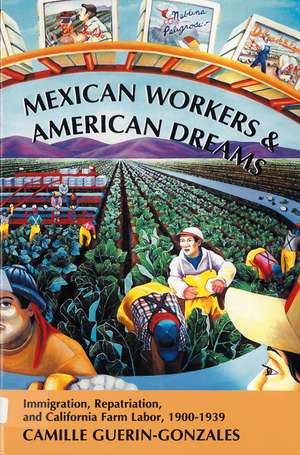Mexican Workers and the American Dream: Immigration, Repatriation, and California Farm Labor, 1900-1939
Autor Camille Guerin-Gonzalesen Limba Engleză Paperback – mai 1994
"Guerin-Gonzales's special contribution is the link she explores between immigrant experience and the American dream. The towering irony her fine book reveals is how an ideology of promise for others was for the Mexican migrants the justification for their exploitation and, when the Great Drepression struck, for expelling many of them from the country."--David Brody, University of California, Davis
"Based on exhaustive research in U.S. and Mexican archives, this study offers a richly-textured history of Mexican immigrants in rural California. A work of exceptional breadth, especially with regard to repatriation, [it] is a pivotal contribution to Chicano historiography and immigration studies."--Vicki L. Ruiz, Andrew W. Mellon All-Claremont Professor in the Humanities, The Claremont Graduate School
In the first forty years of this century, over one million Mexican immigrants moved to the United States, attracted by the prospect of farm work in California. They became workers in industrial agriculture --barely recognized, never respected, and poorly paid. Native white American workers did not resent the Mexicans during prosperous times, when everyone who wanted to work could do so. But during the Great Depression, native workers began to realize that many of the Mexican workers were here to stay. Native workers, blaming their unemployment on the immigrants, joined with government officials to demand that Mexican workers and their families return to Mexico. During the 1930s, the federal government and county relief agencies cooperated in a nasty repatriation program, forcing half a million Mexicans living in the U.S. to return to Mexico.
Camille Guerin-Gonzales tells the story of their migration, their years here, and of the repatriation program--one of the largest mass removal operations ever sanctioned by the U.S. government.She documents both their efforts to resist and the overpowering forces that worked against them.
"Based on exhaustive research in U.S. and Mexican archives, this study offers a richly-textured history of Mexican immigrants in rural California. A work of exceptional breadth, especially with regard to repatriation, [it] is a pivotal contribution to Chicano historiography and immigration studies."--Vicki L. Ruiz, Andrew W. Mellon All-Claremont Professor in the Humanities, The Claremont Graduate School
In the first forty years of this century, over one million Mexican immigrants moved to the United States, attracted by the prospect of farm work in California. They became workers in industrial agriculture --barely recognized, never respected, and poorly paid. Native white American workers did not resent the Mexicans during prosperous times, when everyone who wanted to work could do so. But during the Great Depression, native workers began to realize that many of the Mexican workers were here to stay. Native workers, blaming their unemployment on the immigrants, joined with government officials to demand that Mexican workers and their families return to Mexico. During the 1930s, the federal government and county relief agencies cooperated in a nasty repatriation program, forcing half a million Mexicans living in the U.S. to return to Mexico.
Camille Guerin-Gonzales tells the story of their migration, their years here, and of the repatriation program--one of the largest mass removal operations ever sanctioned by the U.S. government.She documents both their efforts to resist and the overpowering forces that worked against them.
Preț: 286.30 lei
Nou
Puncte Express: 429
Preț estimativ în valută:
54.79€ • 59.49$ • 46.02£
54.79€ • 59.49$ • 46.02£
Carte tipărită la comandă
Livrare economică 22 aprilie-06 mai
Preluare comenzi: 021 569.72.76
Specificații
ISBN-13: 9780813520483
ISBN-10: 0813520487
Pagini: 214
Dimensiuni: 152 x 229 x 15 mm
Greutate: 0.31 kg
Ediția:None
Editura: Rutgers University Press
Colecția Rutgers University Press
ISBN-10: 0813520487
Pagini: 214
Dimensiuni: 152 x 229 x 15 mm
Greutate: 0.31 kg
Ediția:None
Editura: Rutgers University Press
Colecția Rutgers University Press
Notă biografică
Camille Guerin-Gonzales is an associate professor and chair of the Cesar Chavez Center for Chicana and Chicano Studies at the University of California, Los Angeles.
Cuprins
Acknowledgments
Introduction
PART ONE: WHITE AMERICAN DREAMS
1 Pastoral Dreams in California
2 Mexican "Birds of Passage"
PART TWO: RACIAL LIMITATIONS OF THE AMERICAN DREAM
3 Whiteness and Ethnic Identity
4 "Mexicans Go Home!"
PART THREE: DREAMING AMERICA
5 Los
Introduction
PART ONE: WHITE AMERICAN DREAMS
1 Pastoral Dreams in California
2 Mexican "Birds of Passage"
PART TWO: RACIAL LIMITATIONS OF THE AMERICAN DREAM
3 Whiteness and Ethnic Identity
4 "Mexicans Go Home!"
PART THREE: DREAMING AMERICA
5 Los
Recenzii
Based on exhaustive research in U.S. and Mexican archives, this study offers a richly textured history of Mexican immigrants in rural California. A work of exceptional breadth, especially with regard to repatriation, [it] is a pivotal contribution to Chicano historiography and immigration studies.
Guerin-Gonzales's special contribution is the link she explores between immigrant experience and the American dream. The towering irony her fine book reveals is how an ideology of promise for others was for the Mexican migrants the justification for their exploitation and, when the Great Drepression struck, for expelling many of them from the country.
A valuable study of an essential part of American history . . . [and] a demonstration that commitment and compassion can coexist with solid scholarship.
Enriches our understanding of the first four decades of the twentieth century.
Descriere
Earlier in this century, over one million Mexican immigrants moved to the United States, attracted by the prospect of work in California's fields. The Mexican farmworkers were tolerated by Americans as long as there was enough work to go around. During the Great Depression, though, white Americans demanded that Mexican workers and their families return to Mexico. In the 1930s, the federal government and county relief agencies forced the repatriation of half a million Mexicans--and some Mexican Americans as well. Camille Guerin-Gonzales tells the story of their migration, their years here, and of the repatriation program--one of the largest mass removal operations ever sanctioned by the U.S. government. She exposes the powers arrayed against Mexicans as well as the patterns of Mexican resistance, and she maps out constructions of national and ethnic identity across the contested terrain of the American Dream.



















